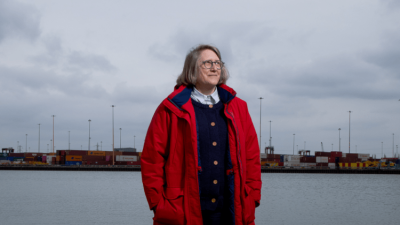
Rewriting Women into Maritime makes London International Shipping Week debut
Rewriting Women into Maritime makes London International Shipping Week debut.
This page is approximately a 5 minute read
This page was published on

Tim Slingsby, Director of Skills and Education
Tim Slingsby is Director of Skills and Education at Lloyd’s Register Foundation.
There is a demand for vacancies in STEM, with 125,000 unfilled roles in 2022
We depend on science, technology, engineering, and maths to propel society forward, but STEM is still seen to many as an exclusive club – open only to those with degrees or advanced qualifications, meaning the future world-changers are yet to be found and risk being deterred. Society is far from fairly represented in STEM,1 portraying a false sense of elitism that deters diverse, budding young talent. Here, Lloyd’s Register Foundation’s Director of Skills and Education, Tim Slingsby, explains how a UK-based global initiative is working to change this.
Give us some space
The ‘Making Spaces’ project, led by UCL Professor Louise Archer, launched in 2020. Funded solely by Lloyd’s Register Foundation, the initiative focuses on the growing global phenomenon of ‘makerspaces’ – physical locations designed for people to come together to create and collaborate.2 The project focuses on bridging the inequalities in STEM and strives to encourage participation from underrepresented communities, through working in collaboration with practitioners.
In 2020, the UK government acknowledged the importance of STEM with £179 million of investment into the future of UK science.3 Funding is vital to fuel growth and success in STEM but doesn’t directly address under-representation. As a result, earlier this year, the Science and Technology Committee published a report on ‘Diversity and Inclusion in STEM’.4
The report highlights the current demand for vacancies in STEM, with 125,000 unfilled roles in 2022.5 Significantly, acknowledgement of past trends in the field are also made. An inquiry held in 2013-2014 highlighted women, people from ethnic backgrounds, people with disabilities, people from low socio-economic backgrounds and people from the LGBTQ+ community as underrepresented in STEM. Evidently this is not a new discovery - yet sadly little has changed a decade later. Despite the report recognising the essential roles of effective diversity and inclusion strategies, to date, there is no detail about how to implement this support the education sector needs. One of the responses to the challenge is Making Spaces.
Early encouragement inspires the next generation
To encourage diversity in STEM, we need to listen to the next generation and identify the point at which these prejudices and barriers initially arise.
There is a false gender division between subjects which is evidenced in STEM uptake. In fact, the report from the Science and Technology Committee attributes the low uptake of STEM by girls at A-level down to this rhetoric. It states that “the view reflected longstanding and wider perceptions and prejudices in society as to which subjects girls ‘should’ study, coupled with a discouraging environment for girls in maths, physics and computing.”6
The access point into STEM begins in the classroom and yet this bias deters many young people from pursuing a subject they may have been interested in. In the UK alone, there is a shortfall of 55,000 skilled engineering professionals per year.7 We can fulfil the demand for engineers using diverse, young talent to solve critical global issues, but space needs to be allocated to nurture the next generation.
How makerspaces can bridge the divide and plug the gap
The Making Spaces initiative expanded internationally in 2022 but the focus of each session remains the same. Young people are encouraged to participate in hands-on learning, collaborating with one another on creative projects. The traditional established learning environment doesn’t work for many young people who feel the culture of STEM excludes them. The narrative that specialising in a STEM field must happen at an early stage often means many young people think they have missed the opportunity to find their future career. In the UK, we rank low in the global STEM degree uptake, with only 26% of graduates choosing to study STEM at higher education.8
Makerspaces aim to break this stereotype - encouraging young people to realise their potential with no time constraints or restrictions – focusing on creativity and collaboration. These specially purposed environments provide vital opportunities to encourage diversity through growing underrepresented communities in STEM. There is clear evidence that there is a lack of diversity both in the NHS and among the boards of top UK tech firms, which must be addressed.9
The lack of diversity in STEM isn’t just unfair – it’s dangerous. For example, a commercial algorithm used in U.S healthcare has been found to heavily discriminate against black people – using an algorithm based on white people.10
This bias present at all levels in STEM visibly affects real-world outcomes in some of our most important professions. We need to stop this from developing at its root – in the classroom. And for those who don’t learn well in a traditional school environment – makerspaces provide an excellent opportunity for young people to develop their passion and find confidence in STEM through hands-on learning.
Initiatives such as Making Spaces provide a non-traditional route into the world of STEM and should be encouraged and celebrated by practitioners and industry professionals. Each UK partner makerspace specialises in a specific area, offering opportunities to learn a variety of skills including coding, engineering and robotics. Attendees are also encouraged to apply their newfound skills to real-world issues in their local communities. By cooperatively working together across the sector, the gaps in employment can be filled with future talent that is inclusive and representative of our society.
To find out more about the Making Spaces initiative, visit ucl.ac.uk/ioe/departments-and-centres/centres/centre-sociology-education-and-equity/making-spaces
To find out more about Lloyd’s Register Foundation, go to: lrfoundation.org.uk/
Making space for wider participation in STEM (lrfoundation.org.uk)
Multi-million government investment in the future of UK science - GOV.UK (www.gov.uk)
Diversity and inclusion in STEM - Science and Technology Committee (parliament.uk)
See ref 4
See ref 4
Engineers in demand in the UK and throughout the world | Michael Page
See ref 8